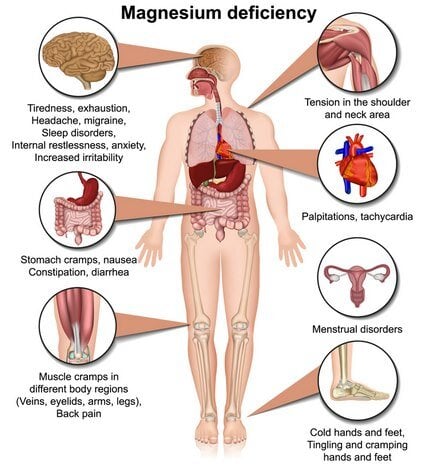We have all heard of magnesium. We know it’s good for… well something to do with muscles, right?
I’m here to share a few important reasons as to why we need an adequate amount of magnesium in our daily diet.

Magnesium is a well-known and important mineral found in nature, and it is crucial to the health of the body. It is used in almost every metabolic process occurring in the body, including maintaining healthy heartbeat, regulating blood pressure and blood sugar, taking care of muscle and nerve function, and making protein, bone and DNA! Considering how vital this mineral is to the body, it is actually one of the leading nutrient deficiencies.
The good news is – we only need small amounts of magnesium compared to other nutrients. BUT! We need to regularly replenish this amount in order to prevent deficiency, as magnesium is used in so many normal processes in the body.
Deficiency symptoms:
- Muscle weakness and cramps
- Restless leg syndrome
- Sleep problems/insomnia
- Mood swings/emotional ups and downs
- Increased PMS symptoms
- Other nutrient deficiencies
- Hypertension, high blood pressure, heart problems
- Headaches/migraines
Just to name a few…
You can get magnesium in your everyday diet as it is naturally present in some foods.
 Here are some foods that are high in magnesium:
Here are some foods that are high in magnesium:
- Leafy greens, especially spinach
- Dark chocolate
- Avocado
- Almonds
- Black beans
- Pumpkin seeds
Obviously, it is always more preferable to get magnesium from natural food sources, but sometimes a magnesium supplement is required. Especially as we become older or are under a lot of stress.
The best type of magnesium supplement are ones that are highly absorbable by the body. Magnesium chelate is one of the best kinds (and the kind that is naturally found in our foods). Magnesium citrate is also great, and can be used for improving digestion and preventing constipation (as it does have a slight laxative effect). Magnesium glycinate is highly absorbable by the body, making it great for magnesium deficiency and it doesn’t produce a laxative effect like magnesium citrate can.
So how do you know if you are magnesium deficient?
Well, assessing magnesium levels can actually be quite difficult. Blood tests aren’t effective as magnesium generally travels inside cells, not in the blood. That’s why I believe that if you do have some symptoms, it may be better to take a magnesium supplement and ensure your body has the mineral it requires to function optimally!
For more information, check out our website at www.alignchirohealth.com.au
We’ve got your back!
ALIGN CHIROPRACTIC HEALTH CLINIC
